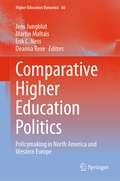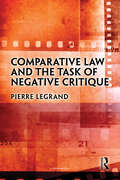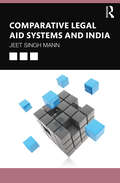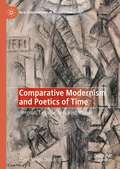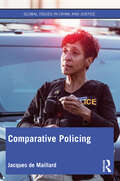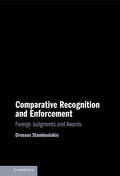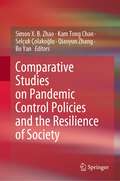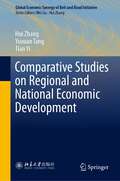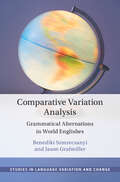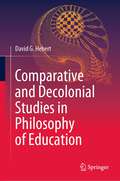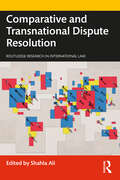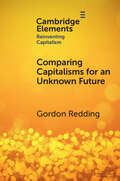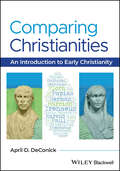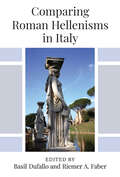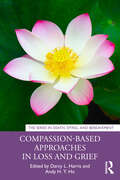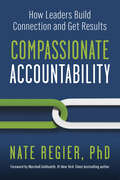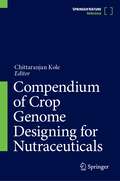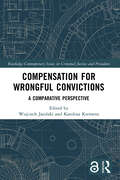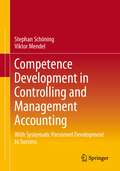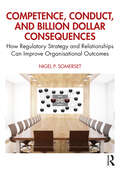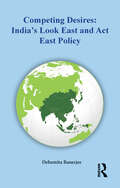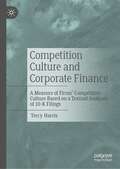- Table View
- List View
Comparative Higher Education Politics: Policymaking in North America and Western Europe (Higher Education Dynamics #60)
by Erik C. Ness Jens Jungblut Martin Maltais Deanna RexeThis volume provides an overview of the state of the art of research on the politics of higher education policy in Canada, the US, and Western Europe. Each thematic chapter combines an extensive literature review with original empirical work that further advances our understanding of policymaking dynamics in higher education.The book covers five key aspects of policymaking, namely the politics of governance as well as funding reforms, the role of interest groups, policy diffusion, and policy framing. These aspects are explored using a unique comparative design that combines comparisons within as well as between regions, and among the five key aspects of policymaking. The conceptual framework is anchored in approaches from institutional theory, namely sociological and historical institutionalism.“This rare book coherently focuses on the same critical challenges that higher education faces in a changing global and national environment. These include vital governance and finance issues and how these are framed and contested by different organizations and interest groups as well as state actors. Within a broad institutionalist framework that reflects the tensions between historical university and national legacies on the one hand and regional and global influences on the other, the authors focus on policymaking in Western Europe, Canada, and the US. This is an engaging and creative endeavor, a must-read for scholars and policymakers alike.”Francisco O. Ramirez, Graduate School of Education Stanford University“This is a real achievement that will contribute to the development of research in politics of higher education policy, finance, and economic development. It is timely in an era when higher learning is increasingly salient to national policy, interest groups, and supranational bodies such as the EU. The focus on Canada, the US, and Europe frames a comparative approach to a competitive higher educational policy arena that has not received systematic study."Sheila Slaughter, Louise McBee Institute of Higher Education, University of Georgia“This fills a gaping hole in research on the politics of higher education. In bringing together research perspectives from governance studies with comparative public policy as well as scholars from Europe and Northern America, this volume will serve as an important reference point for a rapidly growing research field. The exceptionally high quality of editorship is documented by the fact that the chapters are convincingly subsumed under five sub-themes. In short: A must-read for any researcher and student interested in understanding the political foundations of higher education.”Marius R. Busemeyer, Department of Politics and Public Administration, University of Konstanz
Comparative Law and the Task of Negative Critique
by Pierre LegrandThis book’s essays seek to cleanse comparative law of some of the epistemic detritus it has been collecting and that has been cluttering its theory and practice to the point where this flotsam has effectively stultified ‘good’ comparison. While a critique would pursue adjustments to the prevailing model, this text’s negative critique seeks a much more radical refurbishment as it utters an emphatic ‘no’ to the governing epistemology: it pursues, in effect, a deposition and a disposition of the leading epistemic configuration and the various assumptions regarding the acquisition of knowledge about foreign law that inform it. Negative comparative law thus operates at a primordial level inasmuch as it concerns the matter of justice: it aims to do justice to foreign law as foreignness finds itself appropriated and travestied by comparatists for ideological purposes. In the process, negative critique purports significantly to enhance comparative law’s institutional, intellectual, and ethical respectability. This book will benefit all law teachers and postgraduate law students interested in the workings of law on the international scene, whether specialists in comparative law, public international law, private international law, transnational law, or foreign relations law – in particular, individuals bringing to bear a critical inclination to their subject-matter.
Comparative Legal Aid Systems and India
by Jeet Singh MannThis book provides an in-depth analysis of the functioning and challenges of the legal aid system in India. The legal aid system was set up to promote the interests of the economically weaker sections of society that did not have equitable access to judicial systems. However, the system has been largely unsuccessful in delivering justice. Drawing on empirical data from 18 states and 36 districts in India, the book highlights the institutional setbacks that plague the legal aid system and urges us to take cognizance of the hindrances faced by the beneficiaries in availing of these services. It acknowledges the gaps that exist in the governance of the legal aid system in India at the grassroots level and suggests approaches and ways to address these roadblocks to deliver free, swift, and economical access to justice to the poor legal aid beneficiaries. An important critical study of the commitment and competence of legal aid counsels in India, this volume will be an essential read for scholars and researchers of law, Indian law, constitutional law, political science, comparative law, law and gender, and social work.
Comparative Modernism and Poetics of Time: Bergson, Tanpinar, Benjamin, Walser (New Comparisons in World Literature)
by Özen Nergis DolceroccaThis book explores the conceptualization of time in early twentieth-century literature and thought, based on a transnational and translational model of literary history, focusing on Turkish, French and German literary traditions. Each from different cultural backgrounds, these modernists provide a radical critique of modern time regimes, which calibrate time in singular temporal narratives. The book traces the philosophical strand of this critical chronometry from Henri Bergson’s theory of time, through Walter Benjamin’s ambivalence towards decay of tradition, and finally to A.H. Tanpınar and Robert Walser’s modernist fiction. Negotiating regionally marked concepts and topoi of temporality, it discusses networks of cultural circulations and maps a revised intersection of Turkish and Western European literary histories. It is an essential read for scholars and students of comparative and world literature, modernist studies, and cultural history.
Comparative Policing (Global Issues in Crime and Justice)
by Jacques de MaillardThis book is a systematic and comparative analysis of police systems in the Western world, looking at their structure and how they tackle contemporary social problems, such as economic austerity, multi-level governance, transnational change, relations with minorities and transformation of delinquency. Core content includes: • Comparative histories of the formation of national police systems; • A discussion of centralised and decentralised police systems; • International differences in community policing; • A review of different police strategies in fighting delinquency and reducing urban disorder; • A comparative analysis of different ways of controlling police misconduct; • An exploration of different models of plural policing. While other books focus on policing in relation to measures effective in decreasing delinquency and augmenting security, this book considers the political, professional, administrative and political economic parameters which frame and shape the course of police reforms. It also explores how operational policing is shaped by the cultural and institutional contexts in which it is located. It is essential reading for students engaged in international police studies and comparative criminal justice.
Comparative Politics Meaning, Nature and Scope: तुलनात्मक राजनीति अर्थ, प्रकृति और कार्यक्षेत्र
by Kanchan Kumariतुलनात्मक शासन और राजनीति के परिचय के पेपर पर आधारित तुलनात्मक राजनीति अर्थ, प्रकृति और कार्यक्षेत्र को समझने के लिए एक पुस्तक।
Comparative Recognition and Enforcement: Foreign Judgments and Awards
by Drossos StamboulakisThis book provides the first detailed analysis of recognition and enforcement of foreign judgments and awards in civil and commercial matters from a transnational perspective. This perspective facilitates greater understanding of the present state of recognition and enforcement and offers insight into the establishment and operation of key modern instruments. This book represents a timely contribution, as instruments harmonising and promoting recognition and enforcement are increasingly being considered and implemented internationally. Many countries have recently reiterated their commitment to improving access to justice and have indicated an intention to sign one or both of the treaties designed to harmonise and promote recognition and enforcement of civil and commercial judgments internationally: the 2005 Choice of Court Convention or the 2019 Judgments Convention. This book is an essential resource for policymakers, scholars, and intergovernmental organisations to understand the nature and origin of recognition and enforcement approaches, as well as their application, interpretation, and future directions.
Comparative Studies on Pandemic Control Policies and the Resilience of Society
by Simon X. B. Zhao Kam Tong Chan Selçuk Çolakoğlu Qiaoyun Zhang Bo YanThis book documents and analyses the differentiated control policies, the determinant factors behind, social resilience, and international relations during the pandemic from a comparative perspective in a facts-based, data-supporting manner. The intermittent outbreak of cases, public sentiments after long anxiety, questions over the efficacy of vaccines, have forced governments as well as the public to rethink differing approaches and policies in the combat against not just COVID, but the delta variant. In this context, this book establishes itself as a timely product, perhaps the first of its kind, to provide a widely covered individual country-based observation of policies, with an emphasis on multidimensional determinant factors behind the policies. A comparative study of social resilience during the pandemic constitutes another highlight of the book. The different policies tested social resilience differently in parameters such as mortality rates, vaccination coverage, social mobility, travel arrangements, trust in government, and general human development. Above and beyond observations and analyses at local and national levels, this book expands its scope to incorporate international relations, contemplating over the impacts of the pandemic on international relations, power shifts, and new world/global orders, crystallized in the indisputable rise of China.
Comparative Studies on Regional and National Economic Development (Global Economic Synergy of Belt and Road Initiative)
by Hui Zhang Yuxuan Tang Tian YiThis book is devoted to quantify the role of the world's major economies in the international division from the perspective of global value chains and clarify the value cycle system between China and developed and developing economies. This book establishes a theoretical paradigm that conforms to the current world economic structure. That is, the world economic structure gradually shifts from a single-cycle model centered on developed countries to a more complex dual-circulation model. Furthermore, based on the analysis of the current world economic situation, it also analyzes the interaction between trade and investment and the synergistic effect of the Corridors under the Belt and Road Initiative. The first part of the book brings a better understanding of mutual relationships between trade and investment under the Belt and Road Initiative and broadens the research fields of relevant studies. Additionally, comprehensive and specific country research is particularly conducted in this book. By analyzing the economic indicators, reviewing social history and social-economic development, covering various countries along the Belt and Road, it provides deep exploration of the fields and approaches of the most potential cooperation under the purpose of "Peace, Development, Cooperation and Win-Win." Therefore, this part draws a broad map of economic and cultures in order to provide a reference and assistance for promoting the Belt and Road Initiative. Fulfilling this vision, this book hopes to deepen the understanding of economic development of each relevant economy to encourage the participation of economies in regional connectivity.
Comparative and Decolonial Studies in Philosophy of Education
by David G. HebertThis book introduces the educational philosophies of notable African and Asian thinkers who tend to be little recognized in Europe and North America. It offers specific resources for diversification of higher education curricula. The book expands the philosophy of education, in clear language, to include ideas of major non-western educational thinkers who are little discussed in previous publications. It includes critical analysis of non-western concepts and consideration of their relevance to schools worldwide. The book features discussions of how the work of Tagore and postcolonial thinkers offers diverse visions that increasingly inspire a decolonizing approach to education. This book offers a unique emphasis on how a decolonized philosophy of education can especially enable a rethinking of approaches to education in arts and humanities subjects.
Comparative and Transnational Dispute Resolution (Routledge Research in International Law)
by Shahla AliThis edited volume presents research and policy insights into the theory and practice of dispute systems reform in diverse jurisdictions. It highlights how important extra-judicial mechanisms are for resolving cross-border disputes, as evidenced both by the breadth of scholarship dedicated to the issue and the proliferation of parties resorting to non-litigious dispute resolution mechanisms in recent years. Drawing on selected case studies, the book examines the impact of comparative research and policy analysis in advancing reform of dispute resolution institutions at both the regional and global levels. It explores the challenges and opportunities of understanding and assessing developments in systems of dispute resolution in diverse social and political contexts through comparative research. With a growing number of disputes which have come to involve cross-border issues, anyone interested in transnational and comparative dispute resolution will find this book a useful reference.
Comparing Capitalisms for an Unknown Future: Societal Processes and Transformative Capacity (Elements in Reinventing Capitalism)
by Gordon ReddingSystems of capitalism are conceived as formed under certain broad logics that apply to all, but which then interpret those logics in distinct ways society by society, seen as the society's own processes. Such processes cluster into three categories: an inspiring context; a transformative capacity; and empowered action. The political role is that of balancing the influences across the total. Each inspirational influence adds a key contribution, as with benevolent empowering authority, and critical thinking. Transformative capacity is built by: innovativeness and cooperativeness; and stable decentralized authority flows from communicative action, spontaneous emergent ordering; and competitive productivity. Societal progress may be explained in terms of the integrated workings of these processes to yield an ethically legitimate structure for the prosperity-driven creating and distributing of wealth. Two main stereotypes are examined to compare their workings and their outcomes: the Western free market democratic, and the Chinese party-state driven.
Comparing Christianities: An Introduction to Early Christianity
by April D. DeConickA ground-breaking introductory textbook for the study of the New Testament and the first Christians, written for the next generation of students Comparing Christianities: An Introduction to the New Testament and the First Christians maps the historical rise of Christianity out of a network of early Christian movements. This major new textbook systematically explores the struggles to define the faith by presenting Christianity as the result of a lengthy process of religious consolidation which emerged from a landscape of persistent Christian diversity. The book delves into the history of the first five generations of Christians, from Paul to Origen. The first chapter considers the challenges of constructing Christian histories and offers a new model of Christian families to organize and explain the emergence and competition of different varieties of Christianity. Each successive chapter focuses on key issues that Christian leaders engaged over the centuries, demonstrating how the questions they posed and the answers they provided gave Christianity its distinct shape. As the movements competed for social advantage, Christians began identifying certain Christian movements as enemies and consolidated against them. The final chapter schematizes the Christians studied in the book into three families of Christian movements based on the particular God they worshipped and other shared patterns of thought and practice. This chapter also explains where the varieties of Christianities came from and how the process of consolidation undertaken by some churches shaped Christian identity within a forge of intolerance that still affects us today. Comparing Christianities explores the answers to questions: Who were the early Christians and what did they write? What did Christians think about sex, women, immortality, Judaism, suffering and death? What rituals did the first Christians practice, and what did their religious experiences mean to them? How did Christians live in a Roman-dominated world? How did the first Christians explain the origins of their movement?Comparing Christianities: An Introduction to the New Testament and the First Christians serves as an excellent primary textbook in undergraduate classrooms for Introduction to Christianity, Introduction to Religion, New Testament Studies, Christian Origins, World Religions, and Western World Religions, and a thought-provoking resource for anyone wishing to know more about Christianity.
Comparing Network Governance in England and China (Understanding Governance)
by Yongmei LiThis book compares network governance practices and public service delivery in England and China. Adopting a political ethnographic approach, it assesses whether networked forms of governance are used in provision of care for the elderly and those with learning disabilities in the two countries. It also examines several concepts from network governance theory - including interdependence and resource exchange, trust and reciprocity, and diplomatic skills - in the context of English and Chinese local state engagement with NGOs providing and managing care. Perhaps surprisingly, the book argues that there are more similarities than differences in network governance practices in England and China. It will appeal to all those interested in network governance theory, public administration and comparative politics.
Comparing Roman Hellenisms in Italy
by Basil Dufallo Riemer A. FaberThe story of Roman Hellenism—defined as the imitation or adoption of something Greek by those subject to or operating under Roman power—begins not with Roman incursions into the Greek mainland, but in Italy, where our most plentiful and spectacular surviving evidence is concentrated. Think of the architecture of the Roman capital, the Campanian towns of Pompeii and Herculaneum buried by Vesuvius, and the Hellenic culture of the Etruscans. Perhaps “everybody knows” that Rome adapted Greek culture in a steadily more “sophisticated” way as its prosperity and might increased. This volume, however, argues that the assumption of smooth continuity, let alone steady “improvement,” in any aspect of Roman Hellenism can blind us to important aspects of what Roman Hellenism really is and how it functions in a given context. As the first book to focus on the comparison of Roman Hellenisms per se, Comparing Roman Hellenisms in Italy shows that such comparison is especially valuable in revealing how any singular instance of the phenomenon is situated and specific, and has its own life, trajectory, circumstances, and afterlife. Roman Hellenism is always a work in progress, is often strategic, often falls prey to being forgotten, decontextualized, or reread in later periods, and thus is in important senses contingent. Further, what we may broadly identify as a Roman Hellenism need not imply Rome as the only center of influence. Roman Hellenism is often decentralized, and depends strongly on local agents, aesthetics, and materials. With this in mind, the essays concentrate geographically on Italy to lend both focus and breadth to our topic, as well as to emphasize the complex interrelation of Hellenism at Rome with Rome’s surroundings. Because Hellenism, whether as practiced by Romans or Rome’s subjects, is in fact widely diffused across far-flung geographical regions, the final part of the collection gestures to this broader context.
Compassion for Couples: Building the Skills of Loving Connection
by Michelle BeckerHow resilient is your relationship? Do you and your partner go into "reactivity mode" when a conflict arises? Do you wish you were closer and more connected? We all need healthy, secure relationships in order to thrive/m-/but they can be hard to build and maintain. Where do you start? According to marriage and family therapist Michelle Becker, the answer is with yourself. By learning to practice self-compassion, you are better able to respond to your partner with love and acceptance/m-/even when they inevitably cannot meet your every need. This caring and insightful guide shows you how to stop defaulting to feelings of annoyance, disappointment, or detachment. Instead, using techniques from Becker&’s renowned Compassion for Couples program (plus guided meditation practices with accompanying audio downloads) you will learn mindfulness, compassion, and other skills that bring you closer to your partner and enrich your lives together. For happy couples looking to strengthen their relationship, or those facing obstacles, Becker leads the way to greater trust, mutual understanding, and a renewed sense of warmth.
Compassion-Based Approaches in Loss and Grief (Series in Death, Dying, and Bereavement)
by Darcy L. Harris and Andy H. Y. HoCompassion-Based Approaches in Loss and Grief introduces clinicians to a wide array of strategies and frameworks for engaging clients throughout the loss experience, particularly when those experiences have a protracted course. In the book, clinicians and researchers from around the world and from a variety of fields explore ways to cultivate compassion and how to implement compassion-based clinical practices specifically designed to address loss, grief, and bereavement. Students, scholars, and mental health and healthcare professionals will come away from this important book with a deepened understanding of compassion-based approaches and strategies for enhancing distress tolerance, maintaining focus, and identifying the clinical interventions best suited to clients’ needs.
Compassionate Accountability: How Leaders Build Connection and Get Results
by Nate Regier PhDA compass for leaders lost in the paradoxical space between attention to people and attention to results—with Compassionate Accountability you don't have to choose! Sadly, compassion and accountability are too often in tension-leaders feel they have to pick one or the other. But solely prioritizing accountability can create toxic work environments that drive away good talent. On the other end of the spectrum, being too nice can compromise performance and productivity.Finding harmony between compassion and accountability is the ultimate catalyst for improved results and a thriving workplace. The solution is recognizing that compassion and accountability are not opposites. In fact, accountability is an element of compassion. Compassionate Accountability is the process of building connection while getting results. This book shows how this foundational mindset, philosophy, and way of living can lead to a thriving organizational culture. It covers such topics as these: Why you can't practice compassion without accountabilityHow to turn on the three switches of the compassion mindset—and the predictable damaging consequences when they're turned offThe key role Compassionate Accountability plays in a healthy leadership culture Six areas to focus on to start building your culture of Compassionate AccountabilityFive common barriers to compassion for leaders—and how to overcome themPlus, readers will find real case examples of how organizations have adopted Compassionate Accountability, along with quizzes and self-assessments to help them learn and apply the concepts. Leaders seeking a renewed sense of fulfillment in their roles and increased leadership impact will find inspiration, guidance, and a road map for cultural transformation.
Compendium of Crop Genome Designing for Nutraceuticals
by Chittaranjan KoleThe crop plants cater not only to our basic F5 (food, feed, fiber, fuel, and furniture) needs but also provide a number of nutraceuticals with potential nutritional, safety and therapeutic properties. Many crop plants provide an array of minerals, vitamins, and antioxidant-rich bioactive phytochemicals. Increasing incidences of chronic diseases such as cancer, diabetes and HIV, and malnutrition necessitate global attention to health and nutrition security with equal emphasis to food security. This compendium compiles results of researches on biochemical, physiological and genetic mechanisms underlying biosynthesis of the health and nutrition related nutraceuticals. It also explores the precise breeding strategies for augmentation of their content and amelioration of their quality in crop plants under all commodity categories including cereals and millets, oilseeds, pulses, fruits and nuts, and vegetables. The compendium comprise 5 sections dedicated to these 5 commodity groups and presents enumeration on the concepts, strategies, tools and techniques of nutraceutomics. These sections include 50 chapters devoted to even number of major crop plants. These chapters present deliberations on the biochemistry and medicinal properties of the nutracuticals contained; genetic variation in their contents; classical genetics and breeding for their quantitative and qualitative improvement; tissue culture and genetic engineering for augmentation of productivity and quality; and sources of genes underlying their biosynthesis. They also include comprehensive enumeration on genetic mapping of the genes and QTLs controlling the contents and profile of the nutraceuticals and molecular breeding for their further improvement through marker assisted selection and backcross breeding tools. Prospects of post-genomic precise breeding strategies including genome-wide association mapping, genomic selection, allele mining, and genome editing are also discussed. This compendium fills the gap in academia, and research and development wings of the private sector industries interested in an array of subjects including genetics, genomics, tissue culture, genetic engineering, molecular breeding, genomics-assisted breeding, bioinformatics, biochemistry, physiology, pathology, entomology, pharmacognosy, IPR, etc., and will also facilitate understanding of the policy making agencies and people in the socio-economic domain and research sponsoring agencies.
Compensation for Wrongful Convictions: A Comparative Perspective (Routledge Contemporary Issues in Criminal Justice and Procedure)
by Karolina Kremens Wojciech JasińskiThis book presents a comprehensive comparative analysis of the substantive and procedural aspects of compensation for wrongful convictions in European countries and the USA, as well as the standard derived from the case law of the European Court of Human Rights. The collection draws comparative conclusions as to the similarities and differences between selected jurisdictions and assesses the effectiveness of the national compensation schemes. This enables the designing of an optimum model of compensation, offering accessibility and effectiveness to the victims of miscarriages of justice and being acceptable to jurisdictions based on common law, and civil law traditions, as well as inquisitorial and adversarial types of criminal process. Moreover, the discussion of the minimum European standard as established in the case law of the European Court of Human Rights enables readers to identify how the Strasbourg Court can contribute to strengthening the compensation scheme. The book will be essential reading for students, academics and policymakers working in the areas of criminal law and procedure.
Competence Development in Controlling and Management Accounting: With Systematic Personnel Development to Success
by Stephan Schöning Viktor MendelThe book is considered a guideline for systemic personnel development in controlling of nationally and internationally active companies on the basis of a targeted development of competencies. In particular, the challenges posed by digitalization and globalization are considered and substantiated with the help of empirical studies. Employees and managers in controlling as well as HR managers in companies gain a deeper understanding of the necessity and the components of systematic personnel development. The goals are the formation of high-performance teams in controlling as well as the identification of personal career paths on the way to top management tasks as CFO. The focus of the personnel development model is on the transfer of the competence-oriented development approach, which, in addition to the traditionally considered technical and methodological competencies, also takes into account social and personal competencies as well as additional digital and intercultural competencies. The book is rounded off by a survey of the current situation, the definition of a target situation to be aimed at, the discussion of suitable further training measures and the monitoring of the level of competency achieved, and illustrates concrete career concepts.
Competence, Conduct, and Billion Dollar Consequences: How Regulatory Strategy and Relationships Can Improve Organisational Outcomes
by Nigel P. SomersetThis practical guide to understanding how regulators build insight and form judgements will help organisations to develop their strategy and approach to engagement and to improve their regulatory outcomes. From robot-assisted surgery and advances in stem cell technology, the explosion in use of social media and advances in computing power to the development of autonomous vehicles and digital environments such as the metaverse, these exciting developments present questions, invite debate and have implications. These rapid new developments also join a world described as being increasingly VUCA (volatile, uncertain, complex, and ambiguous), making industry-regulator relationships more important than ever to prevent consumer harm and to configure business success. This book is written for those who wish to build positive and progressive relationships with their regulators in these exciting times of rapid advancement. From developing their strategy, through to the practicalities of how to prepare and engage with regulators, readers are navigated through an ecosystem of insight to help build an understanding of what informs their regulator’s opinion and judgements. Underpinned with real-world experiences and examples, this book shows that, through clearer strategic focus and more effective relationships, organisations can refine their approach and build their relationships to drive mutually beneficial regulatory relationships that avoid negative consequences and unnecessary costs. Board members, executives, senior leaders, risk, compliance, legal professionals, regulators, and students of business, finance, and law will refer to this book again and again to guide holistic thinking about regulatory relationships and use the insights these can provide to help them calibrate their actions, activities, and progress.
Competing Desires: India’s Look East and Act East Policy
by Debamita BanerjeeIndia’s Look East policy opened up a new strategic dimension to Indian foreign policy. India had significant cultural and diplomatic linkages with the Southeast Asian nations. But India’s non-aligned diplomatic position created a distance between India and Southeast Asia. The adoption of the Look East Policy led to the establishment of economic and strategic ties with Southeast Asia. The policy was revised in the form of the Act East Policy in 2015 in the face of China’s increasing influence in South and Southeast Asia which posed a threat to India’s security. Moreover the Sino-Pakistan liaison necessitated the strengthening of India-Southeast Asia relations. This book is an attempt to trace the development of the Look East Policy, its transition into Act East Policy and its aftermath. These changing parameters will show the decisive impacts on the transformative phases of India’s foreign policy.
Competition Culture and Corporate Finance: A Measure of Firms’ Competition Culture Based on a Textual Analysis of 10-K Filings
by Terry HarrisThis book introduces a measure of firms’ competition culture based on a textual analysis and natural language processing (NPL) of firms’ 10-K filings. Using this measure, the book explores the relationship between competition culture and various phenomena in corporate finance, specifically, institutional ownership structure, stock return performance, idiosyncratic stock price crash risk, meeting/beating analysts’ earnings expectations, and earnings management activity, for a large sample of US-based financial and non-financial firms. In particular, the book provides evidence that transient institutional ownership intensifies firms’ competition culture, while dedicated institutional ownership lessens it. In addition, the book’s findings suggest that firms with greater levels of competition culture achieve higher levels of short-term stock return performance, experience greater incidence of idiosyncratic stock price crashes, and are more prone to meet/beat analysts forecast and engage in accruals-based earnings manipulation. Finally, the book examines the role played by competition culture in financial firms (i.e., banks). Specifically, the book explores the effect of competition culture on bank lending and shows that banks with greater levels of competition culture are generally more prone to engage in procyclical lending activity. The findings of the book have significant policy implications and will be of interests to regulators, accounting standard-setters, managers and those charged with firm governance, career academics and researchers, graduates, and those generally interested in the role played by corporate culture in the related fields of finance, economics, and accounting.
